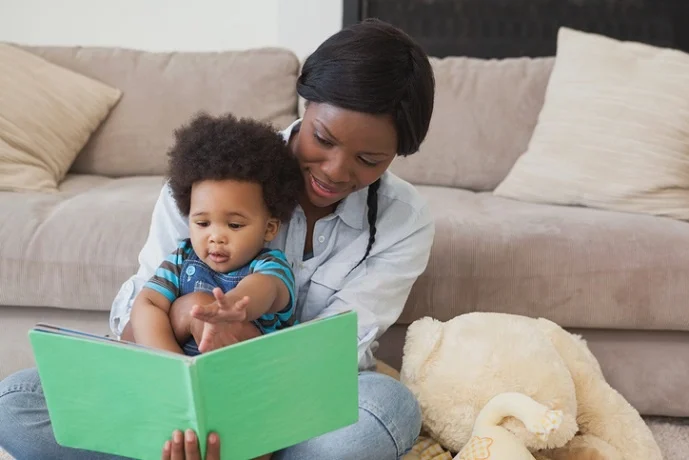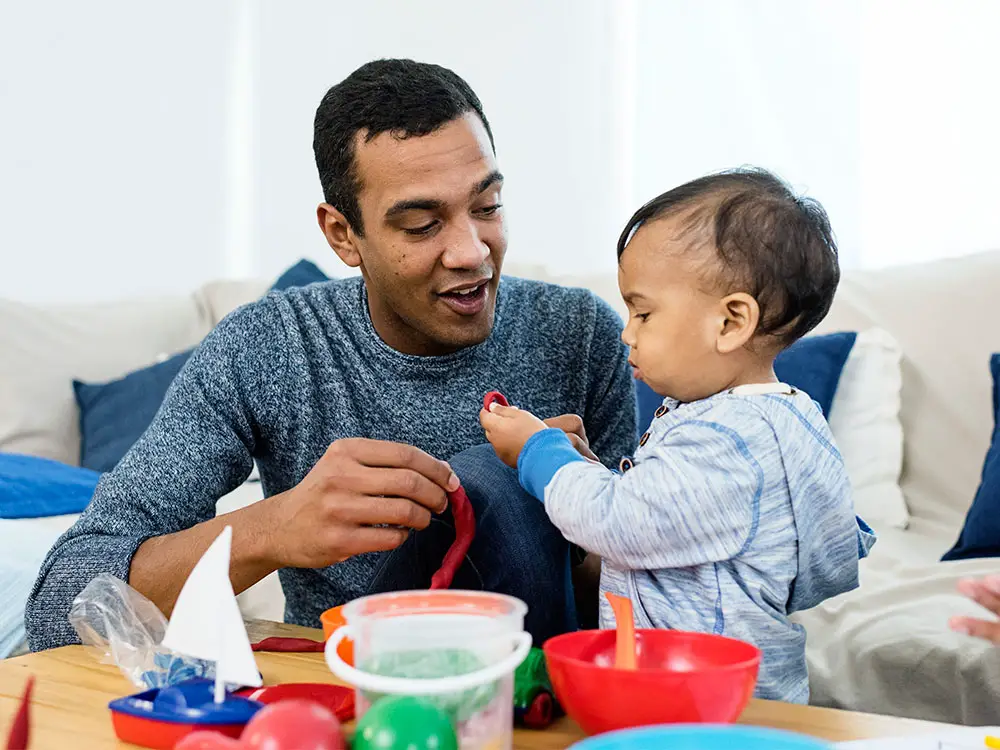We’ve all experienced the thrill of hearing your baby say his or her first words. But what happens when your child reaches a certain age? How many words should a 15 month say?
By 15 months, the majority of children (roughly 75 percent) have a vocabulary that includes “Mama” and “Dada” as well as at least three other words, usually nouns like “cookie,” “ball,” and “dog.” “More,” “No!” and other toddler favorites are common early words. So, how many words should a 15 month say? A typical 15-month-old can also understand simple commands like “Bring me your shoes” or “Put down the book.” They also know what phrases like “No,” “Come here,” “Show me,” and “Look” mean.

There are various reasons a young toddler may struggle with speech and language development; not all are negative. How many words should a 15 month say? Join us as we investigate the speech and language development of children aged 15 months. Read on to know more about how many words a 15-month infant says.
How many words should a 15 month say?
How many words should a 15 month say? Remember, a 15-month-old child is only expected to say 3-5 words other than “mama” or “dada.”
As your toddler’s language develops, other words, typically nouns, will begin to color his or her speech. Words like “ball,” “milk,” and other words that describe objects in your child’s everyday environment are likely to appear first.
How many words should a 15 month say? Children of this age are also more likely to start mimicking phrases, and words heard around them, such as “uh-oh,” “no,” or even “hi”!
How many words should a 15 month say, and does it affect their action?
How many words should a 15 month say? A 12 or 13-month-old will finger and chew on a spoon or bang it on the floor or a pan. A 15-month-old, on the other hand, understands that a spoon is for stirring or eating and will try to use it for that purpose, stirring her oatmeal at mealtime. Rather than simply dragging a broom behind her, intending to sweep the floor with it. When you give your toddler a hairbrush, she will try to brush her hair and the hair of a doll or stuffed animal.
Understanding how to use objects correlates with a child’s ability to use words and express ideas. They are beginning to understand how things work and the consequences of her actions.
You can encourage your toddler to use imagination by acting out a familiar scenario, such as mealtime. Allow your child to be the chef by providing them with a plastic mixing bowl, a manual eggbeater, a spoon, and a strainer. When they’re finished “cooking” something delicious, have them assist you in setting a pretend table so you can share a pretend meal.
How many words should a 15 month say? Children can pretend as soon as they begin to use language – that is, as soon as they understand and use words. Your 15-month-imaginative old’s play will be centered on their actions. They’ll grab a spoon and pretend to eat with it. Or they’ll place her head on your lap and pretend to sleep. They’re using symbols to express themselves, but at this point, their “pretending” closely resembles their actual behavior.

Your child’s capacity to think outside the box grows in the coming months and years. They’ll pick up a stick and wave it in front of you, claiming it’s an airplane flying through the clouds, or they’ll pretend to be someone they’re not, such as a firefighter.
How many words should a 15 month say? Language development in stages
How many words should a 15 month say? Speaking and comprehending speech go hand in hand. Your kid knows what words sound like and how to put sentences together by listening to others. Children learn a language in stages and may reach each stage at a different age. By describing what you’re doing, pointing things out, reading to your child, asking questions, and being a suitable listener, you can help your child develop language skills.
By 15 months, it’s clear that your child understands most of what you say, even if their conversation is still gibberish. This ability to understand spoken language – dubbed “receptive language” by experts – is the first and most important step toward the gift of gab. Since they first heard your voice in the womb, your baby has honed their receptive language skills.
They will gladly comply if you ask your toddler to bring you their favorite toy. They’ll rush to the front door if you tell them you’re going to the playgrounds. Remind her that it’s bedtime, and you might get the opposite – but equally definite – reaction as she runs to hide.
How many words should a 15 month say? Labels
How many words should a 15 month say? Your child’s first words will almost certainly be labels for people, animals, or other things in his environment. They’ll learn single words or short phrases, averaging one or two new ones per month. Then, all of a sudden, though it could happen sooner or later – your toddler will experience what experts call a “language explosion,” where they’re accumulating as many as 10 new words per day.
Your child will struggle to communicate their thoughts more accurately once they have mastered a few words. At first, they’ll do it with inflection. For example, if the cat starts digging in your flowerpot, they may yell, “Cat!” because they’ve seen you do it before.
Is it normal for a 15-month-old to be silent?
How many words should a 15 month say? That depends on your definition of “talking.” A 15-month-old child is only expected to say 3-5 words other than “mama” and “dada.” So, if your child has said or attempted words for a few things, this counts, even if the words aren’t pronounced correctly for each item.
Furthermore, those considered “late bloomers” in speech and language acquisition are typically not identified until they are 18-30 months old. Even so, by age 3-5, these children frequently have normal speech and communication skills.
However, if your child isn’t babbling or attempting to form words by 15 months, it’s time to contact your local pediatrician. One of the most effective interventions you can provide for your child is to address speech and language issues as early as possible. Early intervention is critical for resolving speech and language delays by identifying and addressing the source of these delays.
How many words should a 15 month say? Red Flags of 15-Month-Old Development
How many words should a 15 month say? A 15-month-old who isn’t talking much may or may not be cause for alarm. However, if you examine his or her entire speech and language trajectory during the first year of life, you may discover clues as to whether or not the lack of words will become an ongoing issue.
Among these hints are:
- Does not coo or babble before the age of 9 months.
- By 9 months, they do not say “Mama” or “Dada” (with varying levels of intonation).
- By 15 Months, Doesn’t Say More Than “Mama” or “Dada.”
Remember that simply noticing some of the aforementioned red flags does not imply that your child has a speech or language delay. Some children who do not speak until they are three to five years old eventually learn to speak.
However, you must check in with your healthcare provider and inform them of your toddler’s speech and language development. They will be able to conduct the necessary assessments to determine whether or not your child should receive remediation services in the future.
Meanwhile, do your best to promote and encourage the use of words and phrases at home.

How many words should a 15 month say? Tips on encouraging to learn to talk
It is relatively simple to encourage your child to speak. You can carry out most of the following suggestions at home with little financial investment.
Consider the following methods for improving your child’s speech and language skills at home:
- Narrate
Narrating is an excellent way to draw your child’s attention to words and vocabulary long before he or she begins to speak. You can tell your child about everyday activities such as grocery shopping and visits to the park.
For example, as you put a box of spaghetti noodles in your shopping cart, you could say, “Daddy is going to buy spaghetti this week.” “Mommy is stirring a yummy bowl of chocolate cupcake batter,” for example, while inviting your toddler to assist.
Telling your child what you’re doing as what you do helps to expand his or her vocabulary in a very simple way.
- Interact
Face-to-face interaction and genuine time spent together are excellent ways to bond with your child while encouraging language use.
When you talk with your child in relaxed, comfortable, and enjoyable situations, they are more likely to open up and want to communicate their feelings with you. Schedule plenty of one-on-one time with your child throughout the day.
- Pose Questions
Posing questions to your child is another excellent way to boost their communication skills. You can do this before your child is fully verbal.
Posing queries to your child and then answering them in a fun, enthusiastic, and possibly even LOUD manner will likely capture their attention and make them want more.
For example, asking a non-verbal baby or toddler, “Does Bobby want a piece of cake?” YES! Bobby wants some cake!” draws attention to the word “yes” and shows your child how to respond properly.
You should not answer questions for children who gesture or nod their heads but rather wait patiently for them to answer. Patience is essential!
- Playing a role
When you have one-on-one time with your child, pretend play can be a great way to work on speech and language skills. Speak and act out familiar and relatable things to your child while pretending to play with him or her.
For example, if you and your kid are playing with baby dolls, try talking to and interacting with the doll like you would with your child. Also, remember to name the objects as you play. You can accomplish this simply by asking, “Where is the doll?” Molly, can you find the doll? Oh, she’s there! She was hiding ‘under’ the table. Dolly, I found you!” as opposed to “This is a doll, this is a bottle, this is a Blanket,” etc.
- You should read books to the toddlers
Aside from interacting with your child, one of the most important things you can do to help them develop their language skills is to read to them daily.
Choose books that are appropriate for their age and relevant to their lives. Books about their favorite animal or tasks they are familiar with, such as baking, cleaning up their toys, going to bed, taking a bath, and so on, are all excellent places to begin.
As you read, explain parts of the story in your own words after you’ve finished the page, so your child understands what’s going on. To keep a toddler entertained, always refer to the illustrations.
Permit time for your toddler to enjoy books on his or her own by simply looking at the pages during quiet time. This may instill a love of books in your child in the future.
- Name It
Do you have a child who insists on naming everything they see or touch? If so, seize the opportunity! These are excellent times to engage your child in whatever interests them.
So go ahead and name that object for the 50th time, and when you’re confident they know what it is, ask them, “What is this?” This encourages your child to identify the object on his or her own.
- Entertain
Some songs and shows are particularly effective at teaching children vocabulary words (though human interaction is always best). If you have some leisure time during the day, consider listening to Songs. You can go through many wonderful learning songs for children and preschoolers that you can play on a screen or listen to through a loudspeaker. Please keep in mind that screens are NOT always recommended for children.

Also Read: How Tall is the Average 12-year-Old: The Ultimate Guide for your Child’s Growth
What words should a 15-Month-Old Say?
You should not expect your child to be able to form coherent sentences at this age. You’ll likely be the only one who understands them; strangers will struggle.
They will, however, begin to use common words, particularly about items they use daily. So, what should a 15-month-old child say? At 15 months, your child may say thousands of things, but most of them will be single-syllable nouns or verbs.
Several examples are Milk, Juice, Dog, Cat, Car, Bike, and Ball.
If your child is developing quickly, you may notice that they begin to use more difficult language.
Children as young as 15 months may be able to use social words, adjectives, and prepositions.
These terms could be:
- Prepositions: Up and down
- Adjectives: sleepy, hot, cold
- Social Words: hi, bye
How many words should a 15 month say? Signs of Speech Delay at 15 Months
How many words should a 15 month say? What are the signs of speech delay in 15 months baby? It can be difficult to tell whether a child is a late talker or has a significant speech delay. It’s extremely difficult without the assistance of experienced professionals, so you should consult their pediatrician.
However, there are several signs of a speech delay to look for in a 15-month-old’s speech:
- There is little babbling and sound
If you’ve noticed that your child hasn’t made significant progress in their vocal abilities, it could be due to a speech delay.
This problem frequently manifests as very little babbling and an inability to connect verbally.
Children are very likely to be just as quiet as they were as toddlers.
- Consonant Sounds Are Scarce
15-month-olds with speech delays, like the previous point, will have a limited number of consonant sounds.
They will be unable to use letters like m, b, p, d, y, n, k, and others.
- Impossibility to Mimic Speech
You must employ adult language rather than baby speech when raising your child. This is because your child will learn to mimic certain words and sounds that you say.
Children who cannot mimic or imitate speech at 15 months may have a speech delay.
- Inadequate Social Skills
The average child enjoys playing and interacting with their peers. Lack of social skills is a major indicator of an underlying problem, especially if your child cannot communicate.
They may not interact with other children their age or show a strong disinterest in playing.
- Several Nouns and Verbs
Another simple way to tell if your child has a speech delay is to pay attention to the nouns and verbs used.
As previously stated, children should be able to use at least three nouns by 15 months.
If not, it may signify that you require professional help, such as from a speech-language pathologist.
- History of the Family
As with any other medical condition, family history is important to consider.
Your children are at a higher risk if you have family members who have experienced speech delays or academic difficulties.
Your family doctor will frequently inquire about your communication delay history to refer you to a specialist.

When to Seek Professional Assistance?
Speech delays can be difficult for parents to diagnose, but your pediatrician can help. If you notice your child is meeting the abovementioned problems, it may be time to consult a specialist. You can quickly answer how many words a 15-month-old should say by reinforcing speech and communication.
Ending Thoughts
Language landmarks are accomplishments that mark different stages of language development. They are sensory (hearing and understanding) and explicit (speech). This means that, in addition to producing sounds and words, your baby must also be able to hear and understand.
Most kids say their first words between 10 and 14 months. How many words should a 15 month say? By 15 months, your baby will likely be saying one to three words. They will be simple, incomplete words, but you will understand. They might say “ma-ma” or “da-da” or try to name a sibling, pet, or toy.
Frequently asked questions on how many words should a 15 month say
- What should a 15-month-old child say?
By 15 months, the majority of children (roughly 75 percent) have a vocabulary that includes “Mama” and “Dada” as well as at least three other words, usually nouns like “cookie,” “ball,” and “dog.” “More,” “No!” and other toddler favorites are common early words.
- How many words should a 15 month say on average?
A 15-month-old baby may use three to ten words regularly. They may be crystal clear or use versions of words, such as “ba” for the bottle, but they will still have a clear meaning. At 15 months, they may combine gestures with words or sounds to indicate the meaning of something.
- Is it normal for a 15-month-old not to talk?
If their child has not begun to babble to communicate by 12 to 15 months, parents should consult a GP, health visitor, or speech and language therapist. By 18 months, they have not said their first words. They do not respond well to language; for example, they do not follow simple instructions such as ‘kickball.’
- How can I get my 15-month-old to talk?
Discuss the words you use, such as “cup,” “juice,” and “doll.” Allow your child some time to name them. Inquire with your child about the pictures in books. As your child names what he sees, smile or claps your hands. Discuss what your child is most interested in talking about.

- What does a 15-month-old understand?
A typical 15-month-old can also understand simple commands like “Bring me your shoes” or “Put down the book.” He also understands phrases like “No,” “Come here,” “Show me,” and “Look.”
- What are the symptoms of delayed speech?
By the age of 15 months, your child should not be babbling.
Not talking by the age of two.
By the age of three, the inability to speak in short sentences.
Directions are difficult to follow by your child.
Poor articulation or pronunciation.
Having difficulty stringing words together in a sentence
- Is a delay in speech indicative of autism?
No, not always. While speech delays, language delays, and learning differences are frequently associated with ASD, a speech delay solely does not indicate that a child has autism. There are significant differences between autism-related communication delays and other types of speech-language disorders.

